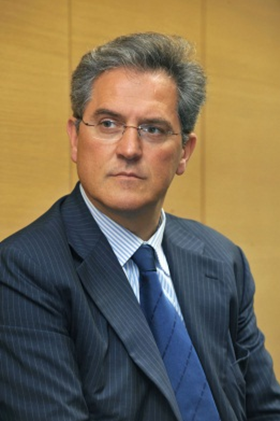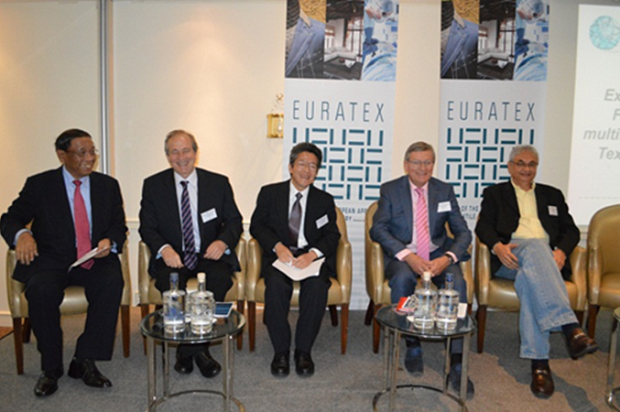
US fashion industry benchmarking study released
The 15 distinguished speakers from different countries and institutions discussed the way textile and clothing markets have changed in the last 20 years and evaluated the impact of the numerous Free Trade Agreements (FTAs) signed across the world during the conference in Brussels last week.

10th June 2014
Knitting Industry
|
Brussels
 More than 140 participants from the industry, research, European institutions and international organisations came to Brussels on 5 June to join the international textile and clothing conference Free Trade and International Agreements.
More than 140 participants from the industry, research, European institutions and international organisations came to Brussels on 5 June to join the international textile and clothing conference Free Trade and International Agreements.
The 15 distinguished speakers coming from different countries and institutions made a valuable contribution to the discussion on the way textile and clothing markets have changed in the last 20 years and on the impact of the numerous Free Trade Agreements (FTAs) signed across the world.
The Euratex President Alberto Paccanelli explained: “You do know how difficult it is to explain to an entrepreneur - regardless of his geographical location – in particular when running an SME, struggling with administrative paperwork, lost in the labyrinth of incomprehensible rules of origin and certification procedures, how important it is for his business to benefit from well-shaped FTAs. But you also know that this entrepreneur will have long-term benefits. That is why it is of utmost interest to listen to what our guest speakers have to say today on this issue.”
The first session of the conference was devoted to the overview of the current textile and clothing trade flows in the world. Gildas Minvielle, Institut Français de la Mode, underlined that world trends confirm that European companies managed to maintain their overall position by changing competitiveness paradigm and by favouring a competitiveness based on products with high added-value and non-price competitiveness content. Nevertheless, to maintain such model it is also important to strengthen the European industrial policy that should also benefit the textile and clothing.
Lauro Panella from the Cabinet of Antonio Tajani, Vice-President of the European Commission and Commissioner for Industry and Entrepreneurship, called upon an innovative approach for industry in order to compete with high added-value products.
Signe Ratso, Director of Trade Strategy and Analysis and Market Access from the European Commission, reviewed the various trade policy tools available for the European Commission for improving the worldwide market access of European textile and clothing exports.
The following conference session was devoted to the benefits generated by the currently enforced FTAs. Introducing the session, Francesco Marchi, Director General of Euratex, underlined that the EU’s FTAs currently in place absorb more than 44% of the 42.2 billion of textile and clothing products exported worldwide.
B.H Kim, International Cooperation & Trade team director from the Korean Federation of Textile Industries (KOFOTI), provided arguments to demonstrate the success of the EU-Korea FTA enforced since July 2012.

Olivier de Croizant, the CEO of Groupe Barbara, French lingerie SME, explained the uneasy choices SMEs might face trying to benefit from different FTAs while company’s strategic choices could hamper or reduce the advantage flowing from such agreement. In his views high-end companies and high added-value content EU companies could benefit from the EU-Korea FTA more easily than smaller size companies that cannot fully profit from the requirements imposed by the agreements.
Turkey’s views on the enforced FTA’s were expressed by Kenan Koç, Board Member from the Turkish Textile Employers’ Association (TTEA). He underlined that Turkish economy and the local textile and clothing industry have successfully overcame the global crisis, but Turkey not being Member of the EU yet was suffering from an imbalanced competition with the other FTAs partners of the European Union.
Rajeev Arora, Executive Director of the African Cotton & Textile Industries Association (ACTIF), provided a valuable overview of the economic development of different regions of the African continent benefiting from Duty Free and Quota Free agreements with the US and the EU.
The third and final session was focused on the impact of the future FTAs and multifaceted agreements on the textile and clothing industry. H. Bekke, Secretary General of the International Apparel Federation (IAF), started the discussion stating that globally the industry prefers multilateral trade liberalisation since it is the best way to reduce costs of doing business but that the second-best choice remains the FTAs provided they do not create a new labyrinth of rules.

Executive Vice President of Japan Textile Association (JTF) and Japan Chemical Fibers Association (JCFA) Hideshi Ueda suggested that the world textile demand will continue to grow in particular in high-innovative textiles market niches.
Rahul Mehta, President of the Clothing Manufacturers’ Association of India and incoming President of the IAF, made it clear that his industry considers the potential EU-India FTA as a chance to be seized for improving the competitiveness of the sector.
Director General of Brazilian Textile and Apparel Industry Association (ABIT) Fernando Pimentel urged for the signature of the EU-Mercosur FTA that is being negotiated for a while now. He made optimistic comments on the importance of sustaining the full value-chain from fibre to consumer while indicating that EU and Brazilian industries can reach a common understanding on key negotiating topics to speed-up negotiations.
Justin Huang, Secretary General of Taiwan Textile Federation (TTF), ended the session by providing the assembly with information on the Taiwanese domestic industrial strategy that he believes will help the companies to overcome the absence of FTAs faced by the country.

Business intelligence for the fibre, textiles and apparel industries: technologies, innovations, markets, investments, trade policy, sourcing, strategy...
Find out more